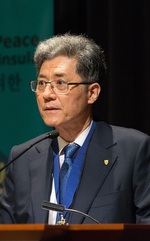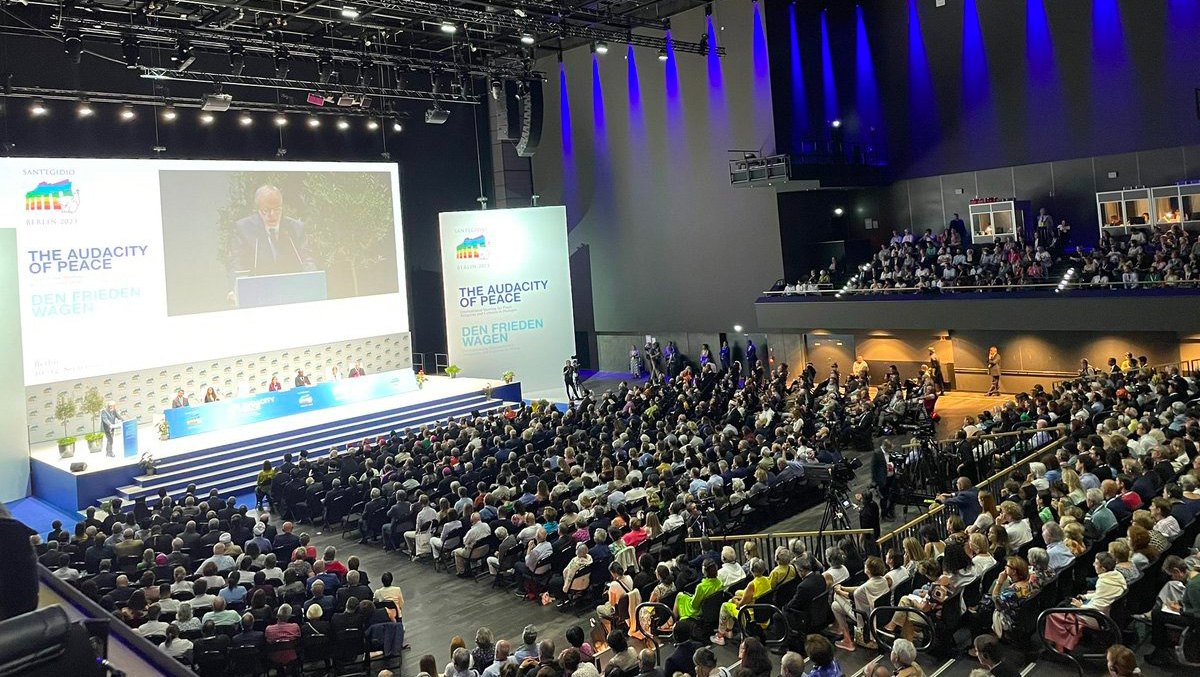
From August 28 to 30 this year I have completed the fourth and the last Roundtable for Peace on the Korean Peninsula among the Korean Methodist Church, the United Methodist Church, and the World Methodist Council during my presidential term. The first Roundtable started in 2016 which was the first year of my term. However, I have already thought about it, though failed in carrying it out, in 2015 when I decided to fast for prayer in the midst of a severe turmoil in the seminary I served as its president. In my sermon preached at the service of my retirement in 2019 I praised the divine providence for designing my life to have worked for the three consecutive roundtables for peace in the global scale even though I had been mocked by most of the counterparts of the roundtable for peace in my seminary.
One’s calling from God comes without noticing it, and it has already begun even before one is born as God said to Jeremiah, “Before I formed you in the womb I knew you, before you were born I set you apart; I appoint you as a prophet to the nations.” (Jeremiah 1:5) More importantly God comes to us when we are most lonely and are about to give up our calling. Most of great prophets and apostles have gone through calling beyond loneliness. One of the most poignant texts on calling beyond loneliness is Jeremiah 15:17: “I never sat in the company of revelers, never made merry with them; I sat alone because your hand was on me and you had filled me with indignations.” Unlike the words of God which were Jeremiah’s joy and his heart’s delight the company of false prophets whom Jeremiah called revelers never made him merry. The false prophets said, “Peace, peace when there is no peace.” (Jeremiah 8:11) And they deceived the people of Judah by saying “This is the temple of the Lord, temple of the Lord!” (Jeremiah 7:4) However, God thrusted Jeremiah out of the merry company of false prophets into loneliness or rather solitude.
Paul Tillich’s interpretation of Jeremiah 15:17 is worth quoting: “God sometimes lays hands upon us. He wants us to ask the question of truth that may isolate us from most men, and that can be asked only in solitude. He wants us to ask the question of justice that may bring us suffering and death, and that can grow in us only in solitude. He wants us to break through the ordinary ways of man that may bring disrepute and hatred upon us, a breakthrough that can happen only in solitude.” (“Loneliness and Solitude,” The Eternal Now, 22-23)
The theme ‘The Audacity of Peace’ and the subtheme of Forum II ‘From Self to Us: a Rout to be Chartered’ challenges me to face the moment of truth to advocate for prophetic call for the Kingdom of God, that is, justice, peace, and joy in the Holy Spirit. The World Methodist Roundtable for peace on the Korean Peninsula has been instrumental in calling for the Kairos Korea which will transform the people of both North and South Korea who have been victims of the East-West Cold War into the agents of the South-North sangsaeng/inter-living.
Jeremiah, prophet after the heart of God, proclaimed on behalf of God, “Let my eyes overflow with tears night and day without ceasing; for the Virgin Daughter, my people, has suffered a grievous wound, a crushing blow.” (Jeremiah 14:17) Resonating with Jeremiah’s shimjung/heart-mind of deep solidarity, I want to witness both victimization and transformation of North Korean women in China who crossed national borders to remain in the Sino-North Korean borderland as illegal economic migrants. Since the national crisis caused by severe famine and economic sanctions in 1990s that was the Arduous March, the breakdown of patriarchy in family as well as in nation after the death of the supreme leader Kim Il-sung has become obvious.
I have come here from the World Methodist Consultation on Migration in Manila, Philippines which was held from September 4-7. I shared a story of a 46-year-old North Korean woman who gave birth to a son from her second marriage to a Korean Chinese in China and decided to migrate to South Korea for better economic opportunities in 2016. When she was in China, she kept in touch with her daughter in North Korea via remittances and regular phone calls. As she wants to find a better environment for her son and economic opportunity for her husband, South Korea is clearly a good option. However, she has started to become anxious about contacting her left-behind daughter since her arrival in South Korea. She suspects that having a defecting mother would result in harsh control over her daughter compared to having a migrating mother living in China. That’s why she would not pick up an international call as it might be from the North Korean secret agency. She feels devastated that her defection would affect her daughter unfavorably.
I would like to ask the Holy Spirit in our prayer to empower North Korean transnational mothers who refuse to be passive victims to affirm themselves as active agents in their productive and reproductive labor in creating new family networks in order to support the children they have left behind, as well as to secure their own safety. Besides our prayer we need to combine acts of mercy and acts of justice. We should act to build an infrastructure of welcome and hospitality and architecture of advocacy and solidarity nationally, regionally and globally. A few North Korean refugees in China decide to go to South Korea. Even though the journey is extremely dangerous and long from Northeast China through South Asia to South Korea, the pressure of illegal status in China and the ubiquitous danger of repatriation to North Korea makes them search for a better place to settle down. I applause the decisive advocacy of the Sant’Egidio Commnity and the Mediterranean Hope for humanitarian corridor for the people of God on the move from Africa, the Middle East and the Eastern Europe. I would like to appeal to this International Meeting for Peace Berlin 2023 to open a new humanitarian corridor in China in collaboration with the Ecumenical Forum for Korean Peace and Reconciliation and Development Cooperation.
Let me finally invite you to stand with the people called Methodists who will gather in Gothenburg, Sweden next year with the theme ‘On the Move: Migration, Pilgrimage and Guiding Lights.’ We are facing in our world today crisis of welcome not the crisis of migration. Many people from the global South have been already crossing the abyssal line dividing metropolitan and colonial societies. They are on the move. Therefore, God is on the move with the people of God. Yes, the Church have to be on the move, too. This is the Kairos moment for a call to be the Church in a new way. As long as we stand in confusion and even in conflict at the crossroads, we will remain as the Church in Exile caught up between the vice of the Empire and the virtue of the Kingdom of God. Acknowledging our origin as the Church in the command of Jesus Christ, we have to look and move toward Christ’s new and glorious coming, walking together forward along the road and no longer stand endlessly at the crossroads. I would like to assure you in humility and love that the World Methodist proposal for the Church on the Move is our Wesleyan response to Pope Francis’ timely initiative to bring the ecclesial reforms forward in the direction of synodality – saying that is the future of the Church in the third millennium. Thank you!
